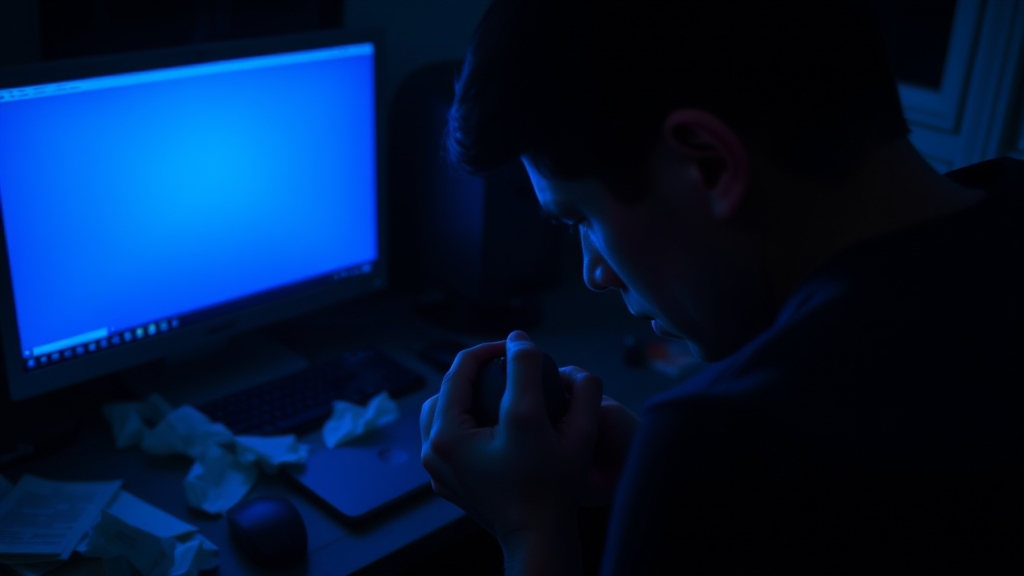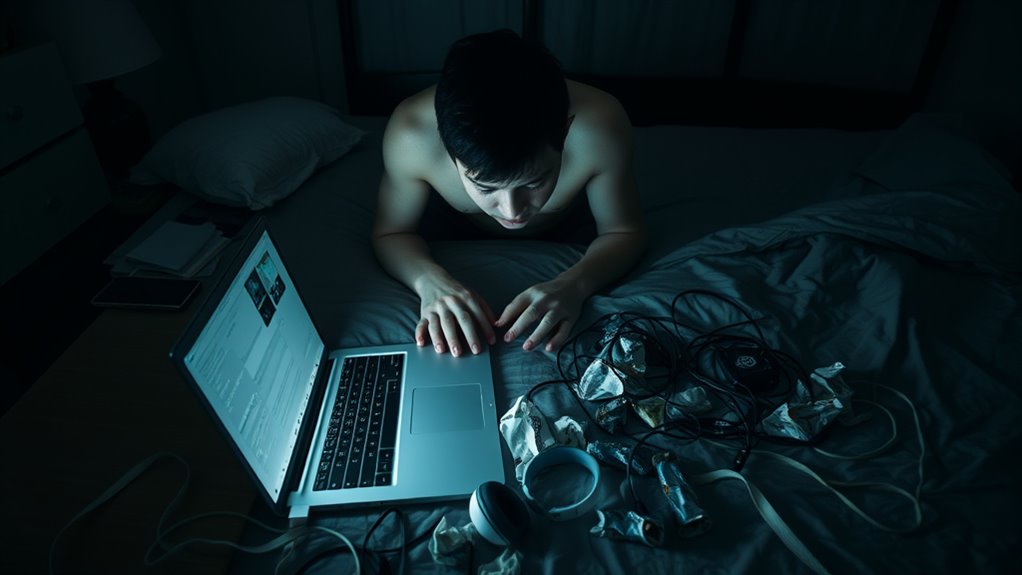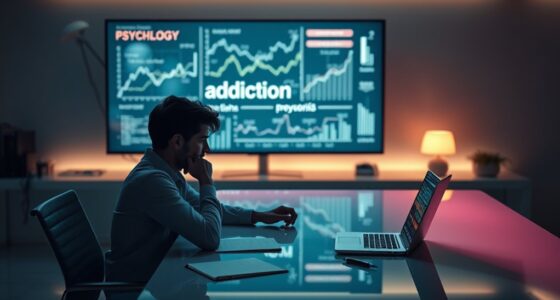Porn addiction often starts as simple curiosity or entertainment but can quietly develop into a compulsive cycle that takes over your thoughts and feelings. Emotional triggers like boredom, anxiety, or sadness push you to seek comfort in pornography. Over time, this behavior becomes a dependency that’s hard to break, impacting your well-being. If you want to understand how this transformation happens and how to regain control, there’s more to uncover here.
Key Takeaways
- Porn addiction begins as curiosity or entertainment but can develop into a compulsive behavior driven by emotional triggers.
- Recognizing emotional triggers like boredom, anxiety, or sadness is crucial to prevent escalation into dependency.
- Recovery involves mindfulness, journaling, healthy activities, and establishing support systems to manage urges effectively.
- Developing personalized recovery plans and understanding behavioral patterns help break the cycle of compulsive use.
- Long-term management emphasizes replacing impulsive reactions with mindful choices and building resilience for lasting change.

Have you ever wondered what porn addiction really is and how it affects your life? At its core, it’s more than just a habit; it’s a compulsive behavior that can take over your thoughts, emotions, and daily routines. You might start out watching for entertainment or curiosity, but over time, it can become a way to escape stress, loneliness, or emotional pain. Recognizing that emotional triggers play a significant role is vital. These triggers—such as feelings of boredom, anxiety, rejection, or sadness—often drive you to seek comfort in pornography, reinforcing the cycle. When you’re feeling overwhelmed or vulnerable, turning to porn can seem like a quick fix, but it only deepens the dependency and complicates your emotional well-being.
Understanding your emotional triggers is the first step toward breaking free from this cycle. Once you identify what prompts your urges, you can start developing effective recovery strategies. These might include practicing mindfulness to stay present with your feelings instead of avoiding them, or journaling to explore underlying emotions that push you toward compulsive viewing. Building healthy coping mechanisms—like engaging in physical activity, pursuing hobbies, or connecting with trusted friends—can help you manage those emotional triggers more constructively. It’s also important to establish a support system, whether through therapy, support groups, or trusted loved ones, who can provide encouragement and accountability as you navigate recovery. Recognizing the role of emotional support in overcoming addiction can significantly enhance your resilience.
Recovery strategies focus on rewiring your responses to emotional triggers. This can mean creating a plan for when urges strike, such as immediately engaging in a different activity or reaching out to someone for support. Developing self-awareness about your habits helps you catch early warning signs of relapse and address them before they escalate. Incorporating knowledge about home theatre projectors and their features can sometimes serve as a positive distraction or hobby during recovery. Additionally, understanding the behavioral patterns associated with addiction can empower you to recognize and modify them more effectively. Recognizing the importance of behavioral science can help you understand the underlying mechanisms of addiction and develop tailored strategies for recovery. Overcoming porn addiction isn’t about avoiding all feelings but learning to sit with them and respond in healthier ways. It takes patience, persistence, and a commitment to understanding yourself better. Remember, setbacks might happen, but they’re part of the process—not the end. With consistent effort, you can replace impulsive reactions with mindful choices, gradually reducing the power of emotional triggers over your behavior. Recognizing that comfort solutions such as engaging in hobbies or social activities can serve as healthy alternatives is also beneficial. Ultimately, recovery is about reclaiming control over your mind and your life, so you can find fulfillment beyond the temporary relief pornography once provided.
Frequently Asked Questions
Can Porn Addiction Affect My Real-Life Relationships?
Yes, porn addiction can affect your real-life relationships. It may lead to emotional intimacy issues, making it harder to connect deeply with your partner. You might also experience social withdrawal, preferring online or solitary activities over face-to-face interactions. Over time, these behaviors can create distance, misunderstandings, and resentment, ultimately damaging trust and intimacy. Recognizing these signs is the first step toward addressing the impact on your relationships.
Is Porn Addiction Recognized as a Clinical Disorder?
Think of porn addiction as a storm brewing quietly before it hits. Currently, it’s not officially recognized as a clinical disorder, but experts acknowledge its neurochemical effects, like dopamine surges that reinforce compulsive behavior. Societal perceptions often influence how people view it, sometimes dismissing it as mere habit. While not yet classified, ongoing research highlights its potential impact on mental health, urging us to pay close attention to these signs.
What Are Common Signs of Porn Compulsive Behavior?
You might notice you’re showing signs of porn compulsive behavior if you feel emotionally dependent on it and often find yourself engaging in compulsive masturbation. You could struggle to control your urges, prioritize viewing over responsibilities, or feel anxious when unable to access porn. These signs suggest your behavior has shifted from enjoyment to an unhealthy pattern, indicating a potential problem that needs addressing for your well-being.
How Does Porn Addiction Impact Mental Health?
Like Icarus flying too close to the sun, porn addiction can melt your mental health. It alters neurobiological effects, impacting your brain’s reward system, and hampers emotional regulation. You might feel anxious, depressed, or isolated as your mood and self-esteem suffer. Over time, this cycle deepens, making it harder to manage emotions or find genuine connection, leading to a spiraling impact on your overall mental well-being.
Are There Effective Treatments for Porn Addiction?
You can find effective treatments for porn addiction through cognitive therapy, which helps you identify and change unhealthy thought patterns. Support groups also provide a safe space to share experiences and gain encouragement from others facing similar struggles. Combining these approaches boosts your chances of recovery, giving you tools to manage urges and rebuild healthier habits. Remember, seeking help is a strong step toward overcoming your addiction.
Conclusion
So, congratulations—you’ve officially graduated from casual viewer to full-blown addiction expert. Who knew that clicking “next” could lead to a never-ending cycle of “fun”? Remember, it’s all fun and games until your screen time rivals your sleep schedule. But hey, at least now you’re armed with knowledge—so next time you’re tempted, you can confidently say, “I’m just doing research.” Or, you know, pretending you have it all under control. Good luck!









